September 22, 2019 Book Reviews, Career, Opinion, Personal
Metacognition. Seeing with your tongue. Implanting fabricated memories. Superintelligence. Immortality. Dataism as religion. Lobsters and your social status. Number anchoring when negotiating your salary. Amoral deception. Illusion of choice and of free will.
Are you intrigued? You should be. I definitely was impressed by some of the new knowledge gained and ideas covered in few books read recently. This post is a set of short one-four paragraph book reviews. Some books I do recommend and some I don’t though still mention them for my personal record and for entertainment reasons and also to prevent you from reading them. Since this is covering 15 books the post is going to be relatively long. Please bear with me.
Learn better
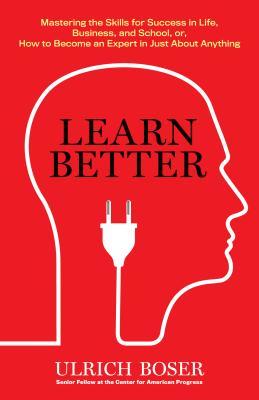
Key idea: Learning is a skill and you can teach yourself to be better in it.
The author advises 6 steps: value – make learning more valuable by associating it to things you appreciate, target – set learning goals, develop – practice with audience or teach, extend – constantly improve understanding of existing knowledge, relate – create relationship between concepts, and rethink – don’t get overconfident and dive deep to understand ever better.
Quote: “The act of writing is a good example of metacognition because when we think about composing sentences and paragraphs, we’re often asking ourselves crucial metacognitive questions: Who will be reading this? Will they understand me? What things do I need to explain? This is why writing is often such an effective way to organize one’s thoughts. It forces us to evaluate our arguments and think about ideas.”
At times I regret how I was studying at university – I could have been much more efficient had I known that the key is to retrieve the knowledge instead of repeatedly consuming information. My interpretation is that the brain works in such a way that when we consume information it is transmitted towards its storage destination igniting complex neural paths in one direction but to retrieve the information the path has to be ignited in the opposite direction as well or otherwise we risk “forgetting”. This brings us to the next book:
The Brain: The Story of You
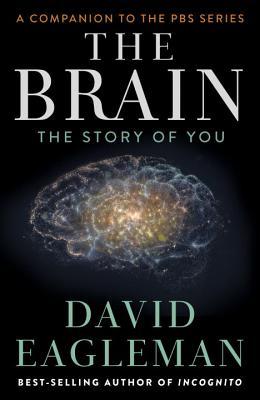
The book if full of all kinds of absolutely fascinating facts about inner workings of our brain. Sometimes even slightly creepy. For instance, read this quote below:
Quote: “So not only was it possible to implant false new memories in the brain, but people embraced and embellished them, unknowingly weaving fantasy into the fabric of their identity.”
Disregard if you believe someone can implant fake memories, this book is totally absorbing and exciting read if you are new to neuroscience and psychology and want good introduction. You would get to learn about extreme adaptive capabilities of the brain and other things. As I understand it, effectively the brain is a powerful interpretation machine taking electrical signals as input (from your ears, eyes, tongue, nostrils, skin) and translating them into flow of bioelectric processing that could cause certain chain reactions resulting in physical actions and/or secretion of chemical substances (hormones) by glands effectively making us alive. Since the brain is such a powerful interpreting machine we can work on providing it with other inputs and teaching it to handle those as well. In this way a guy has learned to see with his tongue and even climb using Brainport. This is a real product for people with disabilities consisting of a camera on outside, a pad put on tongue towards which an electric picture is projected. To extend on this, there is nothing that could prevent us from extending capacity of human body.
Or, maybe, instead we can build artificial general- or super- intelligence to help us out?
Life 3.0: Being Human in the Age of Artificial Intelligence
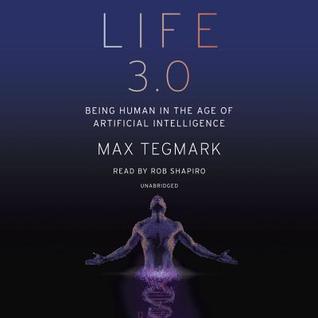
Let’s do versions first: 1.0 – biological when hardware and software evolved, 2.0 – cultural when software is designed and hardware is how it was, 3.0 – technological when both hardware and software are designed. Here “hardware” is human body and “software” is our cognitive abilities to process information.
This book reads almost as science fiction and somehow involuntarily reminds me of movies where robots and humans exist together. The book brings questions of how the society will exist when Artificial General Intelligence becomes a reality. Would we no longer need to work? Would machines try to exterminate us as in Terminator movies or harvest for energy as in The Matrix? I liked be book for bringing all of these interesting questions, entertaining on all kinds of possibilities, and exploring potential solutions to new problems we would eventually have to face and at same time not actually being a fiction.
Can we become super-humans or even gods without the help of AI? Let’s look what the next book says:
Homo Deus: A Brief History of Tomorrow
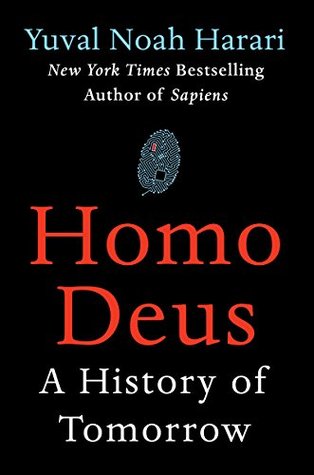
The key idea is that we eventually become god-like and gain ability to control life and environment and Homo Sapiens goes extinct. We might eventually lose our carbon-based existence and just become information.
I really like the structure of this book taking your slowly from understanding how much progress humanity has made by overcoming such horrible things as plagues, famines, and wars. Then the book sets next goals for humanity such as immortality and eternal happiness. The author then projects his historical knowledge and recent achievements in medicine and technology into what future might bring us.
We believed in gods, science, liberalism, other things. Humanism being the main “religion” of 21th century when we celebrate our own intelligence and experiences, but the final and the last one could be Dataism. You can translate everything into data! Everything. Many people measure their pulse, sleep, etc. People with diabetes wear devices that measure blood sugar levels and inject insulin as needed. People post pics on facebook, instagram nonstop, and tweet like crazy. When I run I measure speed, pace, etc and compare to earlier myself and other runners. Oh… and I write this post. Let’s go further: wondering how good sex with your partner is – easy put data sensors that measure, duration, intensity of orgasm, analyses sweat contents and put it on a plot over period of time and you know all you desire to know and, maybe, even compare to results of others. Sounds weird? I bet, but some real companies produce products like this. Now, let’s put even crazier proposition: Do you even exist if you are not connected to net and there is no digital trace of you? Right now, you would think that you do, but maybe in future ubiquitous data stream of human life becomes their life in itself?
Quote: “Senses and emotions are biochemical data-processing algorithms”
Speaking of biochemistry:
12 Rules for life
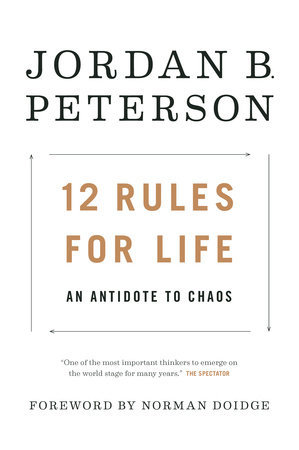
Serotonin is natural hormone associated with feeling of happiness. It is antidepressant you can get prescribed if you’ve got depression. In lobsters serotonin is regulating posture – the more serotonin – the more open lobsters posture is – the higher lobster is in its dominance hierarchy. Let’s call them alpha-lobsters (AL). Other male lobsters would know AL are tough ones and would not take on them and female ones would be attracted to AL. Female ALs would also be the ones with all the mating choices. Lobsters existed since 350M years ago (and if you recall 65M for dinos and some 200-300K for homo sapiens). Now the interesting part: the process of regulating posture and social status is embedded in humans the same way as it is in lobsters. Yeah it is very deep inside us, but, damn, crap, no! So the first rule is “Stand straight with your shoulders back”.
I didn’t like the book, though. Except of the very first rule others are not so fascinating and exciting. Not too sure what exactly to make of the first rule or what other rules are teaching us, but the book is quite popular and the author is very interesting personality (Canadian clinical psychologist with strong views), so instead of reading I would recommend to watch this first: https://www.youtube.com/watch?v=-5RCmu-HuTg (start at 3:40) and if you still want to read all 50 shades of grey in the lobster world – go ahead.
10% Happier
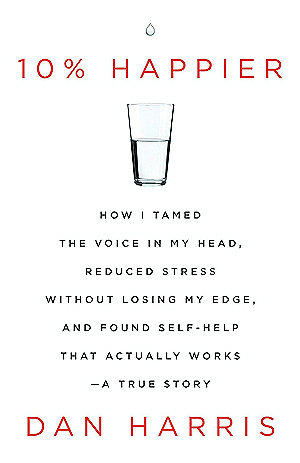
Another book I cannot really recommend. Listing here mostly for myself as not to forget. I read it and, yes, it is quite interesting as a story, but not much more. The book is like a memoir of one of the journalists who discovered his way to practicing mindfulness through his personal struggles of finding himself while building his career, reporting at war, craving for drugs (adrenalin, cocaine, whatever), and interviewing notable people, such as Dalai Lama. The only learning form this book is that celebrated people are often deceiving, they are hiding things and are driven by crazy things. The author didn’t motivate me to start meditating – I still think it is not gonna work for me. Somewhat fun read though, waste of time otherwise.
Speaking of deception:
The 48 Laws of Power
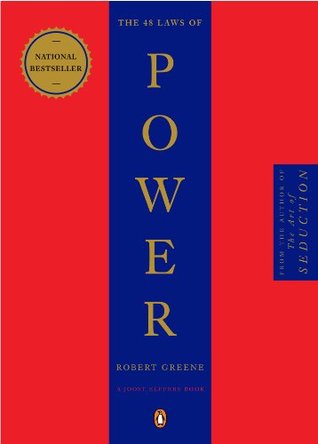
Let’s start with a disclaimer: I do NOT praise this book.
This book effectively teaches you how to deceive others and how to work your way to gain power the evil way. Wikipedia says it is a bestseller popular with prison inmates and celebrities. Description on goodread has this “This amoral, cunning, ruthless, and instructive book synthesizes the philosophies of Machiavelli, Sun Tzu, and Carl Von Clausewitz with the historical legacies of statesmen, warriors, seducers, and con men throughout the ages.”
If you want to understand how amoral this is read the quotes here: https://www.goodreads.com/author/quotes/865.Robert_Greene I don’t even want to repost them here.
Key learning: bad people exist and they could intentionally be manipulating you in psychopathic ways just to get what they want no matter what the price or method. It is good to be aware of such things and try to recognize and distinguish between people with genuinely good intentions and those who are evil. Never be a victim.
The subtle art of not Giving a F*ck
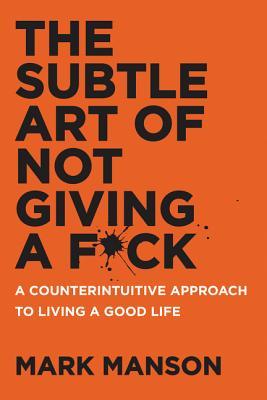
One thing that I like about this one is that the author says it is ok to not try being positive all the time. At times people are overplaying it and it is weird when they pretend to be happy. Acceptance of some of the negative experiences is a positive experience in itself.
The book is an easy and extremely entertaining read, especially if you are feeling a bit stressed and worry about too many things. Definite fun. Most of us like fun, so if you are going to read/listen to it do it mostly for that reason.
Algorithms to live by
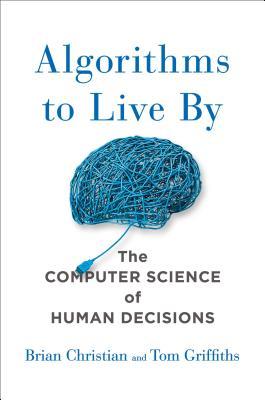
Fun book for software engineers on how you can incorporate computer algorithms into your everyday life. Just go and read. Super easy reading and wonderful way of spending your time.
Wondering how to sort your clothes and stuff in the most effective way? Like maybe sorting them by type? Nope. Wrong answer. The best way is to introduce Least Recently Used cache, making sure stuff you need the most often is always most accessible.
Go ahead and apply game theory towards making your decisions and design mechanisms for decisions instead of relying on good intentions.
Never split the difference
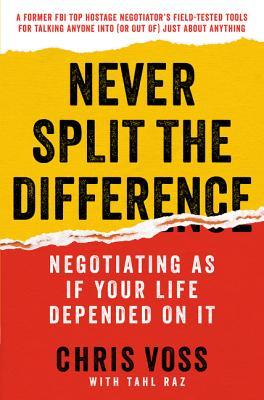
Ok, finally back to slightly more serious books, and I would go as far as to say that this book is a “must read” before your next job offer negation. The book is written by former FBI agent who worked as hostage negotiator.
It is also probably one of the most practically useful books for people who have office carriers like me and would like to apply negotiation techniques in almost any discussion. More often than not, “No” means “wait” or it means there is something the other side doesn’t want to reveal. Your job is to work through what the other side really wants.
Louder than words
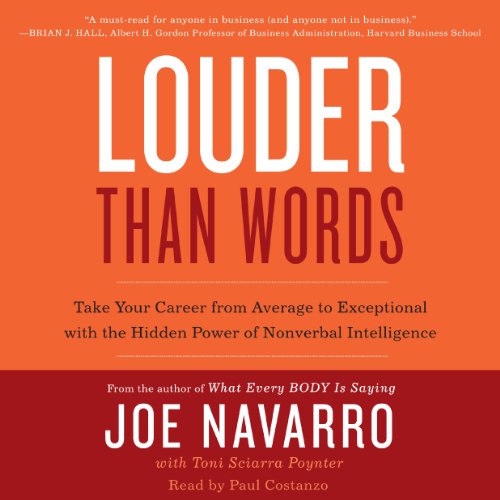
This is a book on nonverbal intelligence. I remember it being intriguing when listening to. We humans are very interested in knowing what others think. They say body language conveys 55% of communication. If this is true then we should benefit from learning to be better at understanding nonverbal messages.
Principles: Life and Work
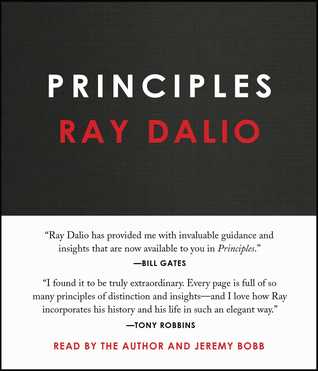
This is really good perspective on how you can structure your life and work around set of principles. I like the emphasis on always getting all the way to truth by overcoming your emotions, ego, and blind spots.
One of the great and unique notions introduced in the book is idea meritocracy that can be applied at workplace based on the following: radical truth – no filter on what you’re thinking, radical transparency – being super open for entire organization, thoughtful disagreement, believability-weighted decision making.
If you don’t have time for the book just want this great video on how economics works and then look at the principles for success videos. These two should be worth one hour of your leisure time. I really appreciate how Ray Dalio is trying to leave some legacy after him.
Extreme Ownership
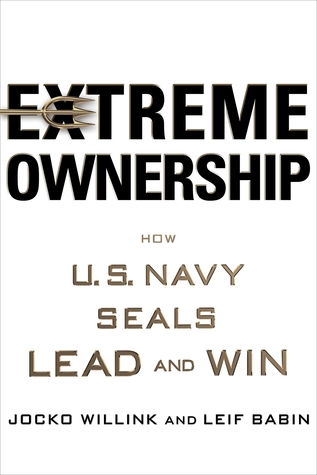
This book is written by former US Navy-Seals who fought in Iraq and in essence is partially memoir and partially book on leadership covering 12 principles towards becoming extreme owner and a real leader. The most memorable are the first and the last. The first one is extreme ownership: always take full responsibility for your own and your team’s results, never blame anyone.
Quote: “Implementing Extreme Ownership requires checking your ego and operating with a high degree of humility. Admitting mistakes, taking ownership, and developing a plan to overcome challenges are integral to any successful team.”
The last principle one is discipline equals freedom: conquer your weaknesses, procrastination since being disciplined means being fee. This brings us to another book:
The Power of Habit
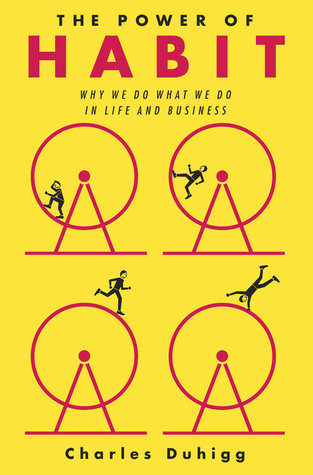
Key learning: most of our lives are structured on top of numerous habits and building right habits could propel you really far forward.
Habits have the following structure: Cue (stimuli) + Response (actions) => Reward (resulting sensations). To build a new habit you need to identify the response – which is the core of what you want to be doing, then you need to come up with cues that would repeat and eventually create craving (same timing, same location, same triggers), and then you need to make sure you get the reward or punishment. Once this is done: repeat-repeat-repeat and at one point you won’t be able to resist.
Quote: “Habits are most malleable when the Golden Rule of habit change is applied: If we keep the same cue and the same reward, a new routine can be inserted.”
Thinking Fast and Slow
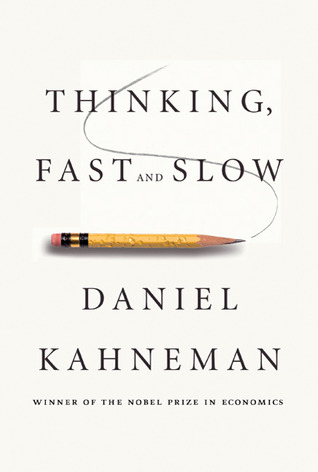
This one is written by Nobel price winner and is probably based on more research done by author himself than any other book in this list. Not an easy read. I definitely recommend the book, but probably don’t listen to it like I did. Get yourself kindle or paper version.
This is a book on how we think about things in realm of two systems: system 1 – fast processing, lazy, and emotional, automatic, and impulsive; system 2 – slow processing, rational, aware, conscious, and considerate. Although the author didn’t give these parallels I tend to think about system 1 as subconsciousness or based on subconsciousness and about system 2 as that of consciousness.
Default rule. Let me give you one example: I lived in Austria for some 6 years. Had I died in car incident I would have been donor of my organs, same is the case for 99% of drivers in Austria. Now, this number is only 12% in neighboring and culturally similar Germany. This is simply because Austria uses opt-out and Germany uses opt-in system when collecting consent. System 2 needs to put consideration in case of opt-in, while system 1 is happy to skip in case of opt-out.
Loss aversion. We are more afraid to loose something than we are eager on getting more of it. Authors provide numerous examples of loose/gain propositions with exactly same statistical outcomes and demonstrate how people choose option that sounds more safe. Unfortunately in real situations what sounds safer could be irrational and more often than not people actually make the wrong decisions. This is especially important when you make money decisions.
There are many other concepts introduced in the book all backed up by research, evaluation and phrases for remembering in the end of each chapter. Just going over all of these concepts is worth your time as it might help you make better decisions. I am considering rereading kindle version of the book after some time.
Conclusion
Personally I find this kind of books very fascinating and engaging as they provoke profound thoughts on our existence and provide guides towards enhancing our future well being.
Hopefully these short reviews are useful to you and will help you pick your next read.
Thank you.
Would be happy to receive quick recommendations on similar books in comments!
3 comments
| Markdown | Result |
|---|---|
| *text* | text |
| **text** | text |
| ***text*** | text |
| `code` | code |
| ~~~ more code ~~~~ |
more code |
| [Link](https://www.example.com) | Link |
| * Listitem |
|
| > Quote | Quote |

Great post with great recommendations ! There is a book called “The Compound Effect” by Darren Hardy is a quick and easy read that teaches some simple, but useful skills around how we can achieve great things by building a habit out of small and minuscule tasks. Great book about how we think about tackling big tasks!
Hey, Robert. Thanks for the comment and for the recommendation! Already added to my book queue.
[UPDATE 29-SEP-2019] Done listening to “The Compound Effect”. It feels more like motivational rant by a training coach pushing you to build right habits and sticking to them. Not as foundational as “The Power of Habit” from the above list, but way more inspiring. So if someone needs a little kick in the butt, this call for action book might work well.
Some say, be 1% better than previous day, something like (1.01)^365 = ~37.78, which is ~3800% better, but I have a very serious reservation on this. Again on numbers: let’s say this is about workouts or running at which case gaining 1% actually hits the limits of human body. I took my best 10K number which is 54:59 (3299sec) – super slow when you compare to the world record of 26:17 (1577sec). Now let’s say I only do 1% improvement every day, or each other 3 day while training over 3 years, then I should be running 10K in 84 seconds with a speed 428km/h (900km/h for world record holder). Of course, this is ridiculous, but my point is that there are so many other things that do not fall under this rule and I bet that our mental capacities also have the limits as all of mental processing is built on top of physical brain. Again, each next 1% is exponentially harder to achieve. Nevertheless it was a good butt kick :).
Thanks.
double time = 3299;for(int i = 0; i < 365; ++i) { time -= time * 0.01; } System.out.println(time);//84.18376472810863
I’ve got few other offline book recommendations and was able to finish reading two of them:
1. “David and Goliath” wasn’t exactly what I expected, but I definitely found intriguing how we can look at well known stories from totally different perspective and how David’s approach has to be taken when you seem to be at disadvantage.
2. “Relentless: From Good to Great to Unstoppable” – found this one to be more of motivational rant. Way-way too much about sports as for my taste. The book quotes are quite motivational: https://www.goodreads.com/work/quotes/27847417-relentless-from-good-to-great-to-unstoppable
But, again, as with any book like that – what matter is what you do afterwards.